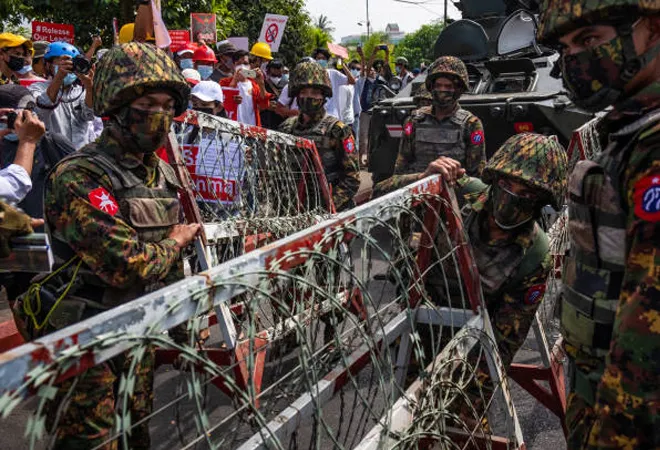 This piece is part of the essay series, Instability in India's neighbourhood: A multi-perspective analysis
This piece is part of the essay series, Instability in India's neighbourhood: A multi-perspective analysis
On 1 February 2021, the Myanmar military or Junta seized power from the second-time elected government, the National League for Democracy (NLD) citing unverified claims of widespread fraud in the 2020 polls. The State Counsellor Aung San Suu Kyi along with a few of the NLD leaders were arrested and the NLD party was banned by the Junta. The coup triggered mass protests to fight the autocracy: Countrywide boycotts, protests, and synchronised civil disobedience movements were launched.
The State Counsellor Aung San Suu Kyi along with a few of the NLD leaders were arrested and the NLD party was banned by the Junta.
The nation is currently fraught with rising humanitarian needs, and an impending economic meltdown seems more probable, triggered by pandemic-induced value-chain disruptions, diminished workforce, food insecurity, destruction of resources, and cash shortages on the domestic front. Additionally, the outflow of capital from the country coupled with fresh
sanctions from western countries has put the country in a precarious external position. The interconnectedness between these economic issues in Myanmar has made the problem more complex.
Domestic economy and capital productivity
The impact of any civil unrest on the domestic economy is always brutal in a multitude of ways. The coup and successive violence have reduced the growth and productivity of the
factors of production (human and physical capital) that form the backbone of the nation, thereby, reducing the return on investment on economic capital. Further, the destructive effects of the coup have invariably hiked the rate of capital depreciation in the nation. The deterioration of Myanmar’s economic capital can be explained through the following lenses.
Firstly, since the start of the COVID-19 pandemic in 2020 and especially after the military takeover of the government, most companies and firms have experienced reductions in sales, shortages in cashflows, and difficulties in accessing banking and internet services. This has been detrimental to the workforce in the economy where the combined effects of the coup and pandemic cost Myanmar around 1.6 million jobs in 2021. Whilst the rural farmers were severely affected by armed conflict; construction, garments, tourism, and hospitality, industries suffered year-on-year employment losses of
31 percent, 27 percent, and 30 percent, respectively.
Secondly, large-scale economic losses and unemployment have induced a food crisis situation wherein a large segment of the population is deprived of nutritionally rich food. Moreover, the military takeover has not only increased the cost of fuel-petrol
by 33 percent and diesel by 29 percent, but the dollar has also started to become more expensive for Myanmar since October 2021. A major fallout of these changes is the increase in the retail prices of almost all the commodities; cooking oil increased almost
three times its earlier price before the coup, and the price of overall food imports increased by 20-50 percent.
Since the start of the COVID-19 pandemic in 2020 and especially after the military takeover of the government, most companies and firms have experienced reductions in sales, shortages in cashflows, and difficulties in accessing banking and internet services.
The country is suffering from a food security crisis that threatens to affect 70 percent of the populace.
Thirteen million people have been estimated to face moderate or severe food insecurity in 2022. Whilst incomes have declined, food and agricultural input prices have increased, pushing vulnerable people to take on debts, spend savings and sell off assets to cover their families’ subsistence needs. The practice of such adverse mechanisms, in addition to eating less or skipping meals, or not consuming food for a day, has increased from 23 percent in 2020 to 33 percent in 2022. In Rakhine State, 30 percent of households reported having no food in 2021 compared with 9 percent in 2020. In Chin State, 58 percent of households reported intaking less food compared with 21 percent in 2020.
Investment outflow and international trade
Myanmar’s economy experienced an 18 percent contraction by September 2021 and since then the growth projected till September 2022 is only
around 1 percent. The stumbling economic parameters bear testimony to the fact that the ongoing political turmoil has devastated the business climate in the economy, decreasing foreign investments to a large extent. Not only are the infrastructure project funding from donor countries, such as the
aid programmes from Japan on the line; many international businesses, such as the
Norwegian telecom giant: Telenor, are reconsidering their investments in Myanmar. Additionally, western economies such as the United States (US), United Kingdom (UK), European Union (EU), and Canada have not only placed sanctions against individuals connected to the Junta regime but also
prohibited business dealings that are controlled by Myanmar’s military.
The sector witnessed decreased demands from not only the domestic side, but its global partners such as H&M, Benetton, and Primark who have also ceased business in Myanmar.
The twin crisis induced by the virus and the coup has also dampened
Myanmar’s external trade, which slumped from US$ 20.36 billion in October 2020 to US$ 15.78 in April 2021. Myanmar’s
garment sector used to be a significant component in the country’s international trade. The garment shipments which rose from US$ 1 billion (10 percent of total exports) to US$ 6.5 billion (30 percent of total exports) from 2011 to 2019 are struggling to operate effectively with tens of thousands of garment factory jobs lost in Myanmar. The sector witnessed decreased demands from not only the domestic side, but its global partners such as
H&M, Benetton, and Primark who have also ceased business in Myanmar. Consequently, factory closures and interruptions in manufacturing, and work stoppages related to COVID-19 and coup restrictions have impacted the sector at large.
Myanmar economic recovery Plan
The Myanmar government is expected to announce the
Myanmar Economic Recovery Plan (MERP) covering the 2021–2022 to 2023–2024 period as a medium-term agenda to facilitate post-COVID-19 economic recovery ahead of the next election in 2023. It is said to contain 30 goals, 165 outcomes and 430 action plans to increase job opportunities and induce value-added economic activities. It is also expected to include reforms in procedures covering taxation, banking, finance, trade, development of the digital economy, transport and supply chains, tourism development, agriculture, livestock and fisheries, and the energy sector. However, no plans or documents regarding this have been announced or forwarded to the public domain to date.
Myanmar is reeling under a critical humanitarian crisis, the worst that the country has faced in the last two decades. The number of displaced people in Myanmar including children has exceeded 1 million by May 2022. The nation seems to have reached a stalemate to advance adequate solutions in the form of economic reforms, to improve the situation of the labour markets and food security. To overcome the challenges posed by the pandemic and political issues, and promote job creation, the Myanmar government needs to implement multiple economic stimulus programmes intended by the MERP to mitigate the economic crisis which seems to be gaining strength every day.
The views expressed above belong to the author(s). ORF research and analyses now available on Telegram! Click here to access our curated content — blogs, longforms and interviews.



 This piece is part of the essay series,
This piece is part of the essay series,  PREV
PREV



